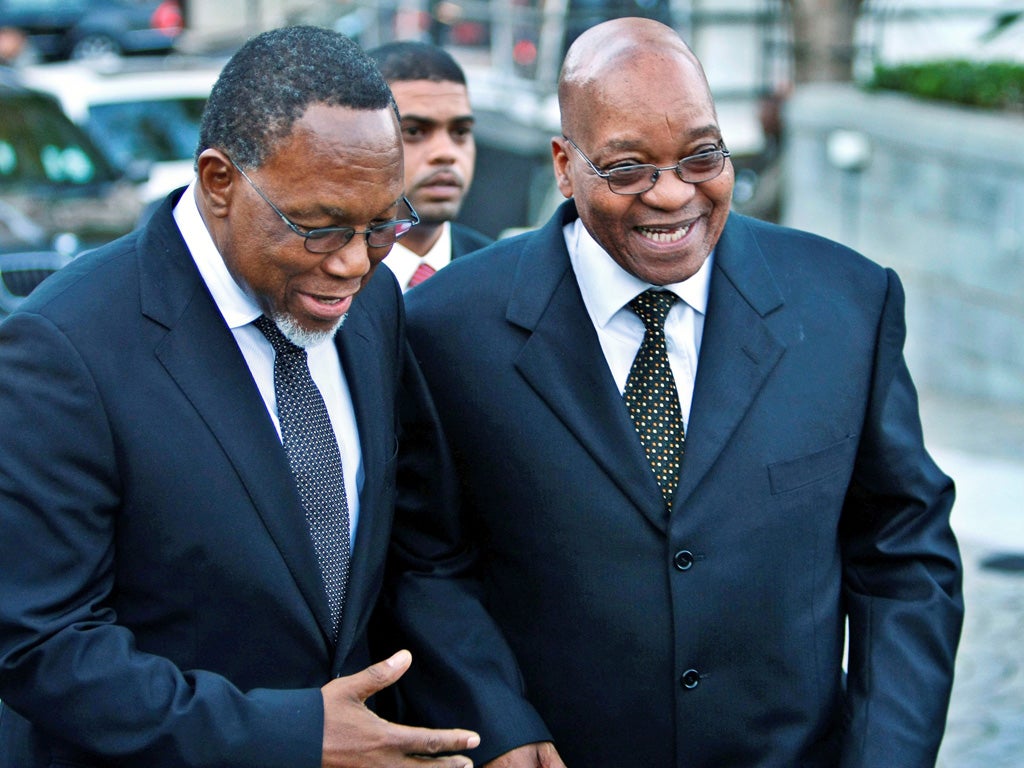Deputy threatens to oust president again – only this time, it's Zuma in peril

Five years ago on a shabby university campus in Polokwane, the capital of impoverished Limpopo Province, the President of South Africa was heckled by his own party members as he took to the podium. Within 24 hours Thabo Mbeki had been ousted as leader of the ruling African National Congress.
It was an unprecedented humiliation for a man who told his aides prior to the leadership vote that "no liberation movement would reject its own leader". The crowd chanted that night for Jacob Zuma, who 18 months later – following a general election – became South Africa's President as well as the leader of the ANC.
It was the culmination of a fierce insurgency against a powerful sitting President fought against a backdrop of rape allegations and corruption charges. Now, as the country counts down to another ANC conference next month, it is Mr Zuma who is fighting for his political life.
His likely challenger is Kgalema Motlanthe. Like Mr Zuma in 2007, Mr Motlanthe is a deputy who has been eyeing the top job, trying to calculate if he has enough support to unseat his boss. At the weekend Mr Motlanthe won the backing of several influential branches of the party, including ANC secretary-general Gwede Mantashe.
The last leadership battle pitted an intellectual and aloof incumbent, Mr Mbeki, against a garrulous streetfighter and man of the people. Mr Zuma is fortunate that his opponent is less fearsome than the one who felled Mr Mbeki. Mr Motlanthe comes from the student wing of the ANC, unlike the older man who cut his teeth running intelligence operations in the liberation struggle.
"Motlanthe is the last chance for the ANC to rescue itself," said William Gumede, author of a new history of the movement, Restless Nation. "The party is so dominant in South Africa that if it is undemocratic then society itself becomes undemocratic."
The mild-mannered son of a mine worker is touted as the clean pair of hands needed to reform a party overrun by crony capitalism. He owes much of his standing in the ANC to his period as a stop-gap President after Mr Mbeki resigned. For 18 months the white-bearded Mr Motlanthe played the statesman while the man known as "JZ" waited for a national election in 2009 to confirm him as head of state. Mr Motlanthe's sober and understated presence was soon missed once Mr Zuma took over. Some observers had hoped that the "100 per cent Zulu boy" as the President styles himself, with a common touch and ready populism, could be a Ronald Reagan figure for South Africa, helping the country feel easier with itself.
Those hopes dissolved quickly as the new leader's habit of telling different, competing constituencies what they wanted to hear led to a period of confusion in the ruling party.
Mr Zuma's sprawling personal life, where his open polygamy and frequent marriages have rarely left the news, has embarrassed many in South Africa. The Marikana mineworkers' massacre in August – the worst state violence since the end of apartheid – happened just as Mr Zuma was embroiled in a scandal over taxpayers' money being used to finance a £17m redevelopment of his rural homestead.
Despite the 2007 Polokwane coup and Mr Zuma's undoubted unpopularity there are several factors that favour the incumbent. The ANC is not a "one member one vote" organisation and only 4,500 individuals will get to vote at Mangaung. The Electoral College has many within it who know that their council seat or state contract depends on support for the leader.
Furthermore, the primary process in which Mr Motlanthe is currently flourishing, is not binding and branch representatives can plump for whomever they choose once the conference vote gets under way. Behind the scenes a frantic effort is under way to persuade Mr Motlanthe to drop his challenge and accept the chance to run for the national presidency in 2014, leaving Mr Zuma as head of the ANC.
Power corrupts: the history of the ANC
1994 Nelson Mandela leads the ANC to victory in South Africa's first democratic elections.
1999 A £5.4bn arms deal leads to allegations of corruption. Jacob Zuma, deputy president of the ANC, is later investigated, and his former financial adviser Schabir Shaik jailed. In June, ANC wins election with Thabo Mbeki as President.
2003 Winnie Mandela, head of ANC Women's League, convicted of theft and fraud.
2004 ANC is re-elected.
2007 Jacob Zuma defeats Mbeki in a bitterly contested election for the leadership of the ANC. A week later, Zuma is ordered to stand trial on corruption charges.
2009 Economy in recession for first time in 17 years. Corruption allegations dropped against Zuma. ANC elected with Zuma President.
2012 After weeks of strikes, police open fire on workers at a platinum mine in Marikana, killing at least 34 people. Government sets up judicial inquiry.
Richard Hall
Join our commenting forum
Join thought-provoking conversations, follow other Independent readers and see their replies
Comments
Bookmark popover
Removed from bookmarks